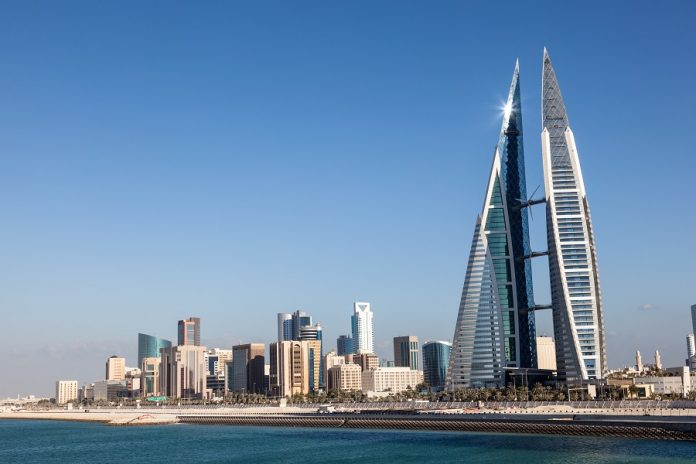MATT SMITH: Bumper government spending helped to ease Bahraini residents’ financial difficulties during the pandemic, but the kingdom faces a tough challenge to reduce its deficit and bolster state revenue without harming an economic recovery.
Bahrain’s GDP shrank 4.9 percent in 2020, the International Monetary Fund (IMF) estimated, as the pandemic dampened domestic consumption and lowered oil revenue. This contraction would have been more severe without a 4.5 billion Bahraini dinar ($11.97 billion) state support package, which equates to about one-third of annual GDP.
The support included a 3.7 billion dinar central bank loan facility to enable loan deferments and provide extra lending, with banks instructed not to charge additional interest during the repayment holiday.
An unemployment fund covered private sector salaries for at least three months, while various fees were waived, including municipality and land rental fees. The government also paid company and individual electricity fees for a minimum of three months and boosted healthcare spending.
Prior to the recent spike in coronavirus (COVID-19) cases, Bahrain’s economic activity was slowly returning to normal, albeit without visitors from overseas, said Nishit Lakhotia, head of research at Bahrain’s Sico Bank.
“People had more disposable income, partly because they weren’t travelling beyond Bahrain and started spending again within the country,” said Lakhotia. “You saw a lot more activity at the malls, but the local population’s spending power alone isn’t enough to support the retail sector.”
The IMF predicted that Bahrain’s economy will rebound in 2021, growing 2.3 percent. Travel restrictions are expected to stay in place on Saudi Arabia’s land border with Bahrain until mid-May, after Eid al-Fitr.
“Bahrain’s service industry, especially retail and hospitality, depends a lot on visitors from Saudi,” said Lakhotia. “We’re looking at an economic rebound probably starting in the second half of 2021.”
Overall government spending rose 4.7 percent year-on-year, the largest in the Gulf according to estimates by Abu Dhabi Commercial Bank (ADCB).
“There has been a significant fiscal deterioration in Bahrain, which will require sizeable fiscal reform measures – the adjustment the country needs to make will be difficult,” said Monica Malik, chief economist at ADCB.
“Before the pandemic, Bahrain had been making quite good progress with its medium-term fiscal reform program, but then loosened spending dramatically due to COVID.”
The government will raise gas prices for key industries by about 6.66 percent in April — gasoline, electricity and water prices have already been hiked over the past few years. Bahrain has reduced its fossil fuel subsidies to 2 percent of GDP in 2019, from 4 percent in 2017, the IMF estimated. Bahrain could also follow Saudi Arabia in raising value-added tax (VAT) to 10-15 percent from the present 5 percent.
Although necessary, such measures – along with reduced state spending – will weigh on Bahrain’s economic rebound as the impact of the pandemic eases, Malik said. Further spending cuts will be tough to implement, S&P Global wrote in a November note that reiterated its credit ratings for Bahrain, maintaining a stable outlook and noting that the government would likely receive further support from its neighbours, should it be required.
Bahrain receives 150,000 barrels of oil daily from Saudi Arabia’s Abu Safa oil field, providing three-quarters of the island’s daily output of 200,000 barrels per day. Hydrocarbons represent less than 20 percent of Bahrain’s economy, but provides more than 70 percent of state revenue, S&P notes. Although Bahrain introduced VAT in 2019, the island’s low-taxation regime means it is vulnerable to the vagaries of the oil sector and has few tools to bolster revenue if crude prices fall.
More positively, the government’s non-oil revenue has surged since the introduction of VAT from $1.3 billion in 2018 to $2.3 billion last year, despite the pandemic.
Gross debt will hit 120 percent of GDP in 2023, a figure that excludes loans from other Gulf Cooperation Council members. Bahrain’s soaring debts have led repayments to increase to 17 percent of expenditure in 2020 from 6.5 percent in 2014.
Bahrain cannot afford to continue allocating so much of its spending to servicing its debts, Malik warned. “That’s why Bahrain has to implement fiscal reforms sooner or later,” she said. “Bahrain’s rising debts will increase the interest repayment bill … the funding requirements will be quite large for Bahrain and it will probably need additional support from the GCC.”
Bahrain succeeded in steadily reducing its fiscal deficit, from $4.3 billion in 2016 to $1.5 billion in 2019 – of which $1.4 billion arose from debt servicing costs. However, COVID relief measures resulted in the 2020 fiscal deficit soaring back to $4.4 billion, or 13.1 percent of GDP.
“The government is trying to cut costs by bringing in efficiencies, however, to reduce fiscal deficit below $1.5 billion the focus needs to be on to further increasing state revenue,” said SICO’s Lakhotia.
In addition to a $10 billion GCC support package, which began in 2018 and has disbursed $6.3 billion, Bahrain has also received $3.5 billion of a $7.5 billion GCC Development Fund, the island’s recent bond prospectus shows.
Yet, despite the pandemic, foreign direct investment (FDI) into Bahrain was $885 million in 2020, up 6 percent year-on-year. “Bahrain remains committed to our long-term objective of diversifying our economy,” said Mahmoof Al Aradi, Co-Chief Investment Officer at the Bahrain Economic Development Board. “We continue to aim to position Bahrain among the top and easiest places regionally and globally to set up and operate.”
He cited research by auditors KPMG that showed operating costs were 20-35 percent cheaper in Bahrain versus its neighbours.
“Bahrain has successfully managed to attract foreign investments, even in 2020,” added Lakhotia. “The country has good investor-friendly regulatory structure; the cost of living is reasonable. It’s an expat friendly country, have strong local talent pool and world class ICT infrastructure, making it attractive for companies to either relocate or set up afresh in Bahrain.”

Bahrain suspends prayers in mosques for 2 weeks over COVID-19Bahrain interior ministry says two attempts to bomb two bank ATMs have been foiled

